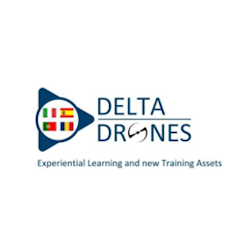DELTADRONES
- Acronym: DELTADRONES
- Project Title: Drones: Experiential Learning and new Training Assets
- Project Reference: 2016-1-IT01-KA202-005374
- Funding Programme: ERASMUS +
- Key Action: Cooperation for innovation and the exchange of good practices
- Action Type: Strategic Partnerships for vocational education and training
- Coordination: Cisita Parma scarl (IT)
- Project’s Total Funding: 341.691 €
- Start Date: 01/12/2016
- End Date: 31/05/2019

Summary
The project aims at:
– socializing (with case studies reconstructed for educational purposes) pupils and teachers of VET schools with drone technology, designing its integration with curricular STEM programs as teacher-led approach- co-designing with companies innovative working environments, developing the necessary resources for an open and transferable WBL for the realization of a project work “pupil-led”, in response to the challenges of application of drone technology
– promoting among students, with a logic of gamification to develop entrepreneurship, a competition of ideas for design, development and implementation of new applications / uses of drones.
Today, 90% of the EU working positions require technical skills: by 2018 the demand for STEM resources will grow by 8% while the average of jobs will grow only by 3%; by 2020 there will be a deficit of 825.000 resources with technological skills; by 2025, due to turnover, 7 million jobs requiring STEM skills will be available. If the realization of the ET 2020 strategy hopes that benchmark doesn’t exceed 15% of students below the age of 15 with low achievements in math and science, data reveal 22% in 2015 (36.6% for students in unfavorable socio-economic conditions). Besides, there is a strong gender-gap: only 32.1% of EU-27 graduates in STEM disciplines is females.
Drones are suitable to promote vocational learning experiences based on experiential practice, in an interdisciplinary approach, in response to the needs of vocational skills development related to key technologies of the digital era and STEM disciplinary skills: engineering for the resolution of design issues, production and maintenance of light aircraft, built with advanced materials that allow the flight in accordance with applicable regulations; mathematics (from trigonometry to set the flight plan, to 3D modelling through the cloud of points for volumetric calculations and remote sensing); the physical and natural sciences to fully understand the application fields of technology.
The project involves a VET secondary school and a business / technology oriented institution in each country, considering countries with similar urgency to address a problem of under-performance and disaffection with the STEM subjects (cfr. Eurydice 2013) and with homogeneous conditions / prospects of development of drone technology (see. “Innovation Union Scoreboard 2015”).
The expected results follow, in the realization of IOs, a logical sequence of industrialization passing from the enabling conditions for the activation of the drones (1- design / assembly of the UAV, 2- study of how to use the data on the ground 3- making of the devices to be installed on board), to real activation of technology (4- study of flight plans) and, finally, to the examination of application problems (5- enhancement of marketability fields).The realization of each of the first 5 IO is divided into the following three macro activities:1) DESIGN 2) TESTING 3) RELEASE
Partners
- Cisita Parma scarl (IT)
- AeroDron S.r.l. (IT)
- CENTRO PÚBLICO INTEGRADO DE FORMACIÓN PROFESIONAL CORONA DE ARAGÓN (ES)
- FUNDACION AITIIP (ES)
- I.I.S. A. Ferrari (IT)
- Istituto di Istruzione Secondaria Superiore “A.Berenini” (IT)
- Istituto Istruzione Superiore “C. E. Gadda” (IT)
- Liceul Teoretic de Informatica “Grigore Moisil” (RO)
- SC Ludor Engineering SRL (RO)
- UNIVERSIDADE PORTUCALENSE – INFANTE D. HENRIQUE (PT)
Links


